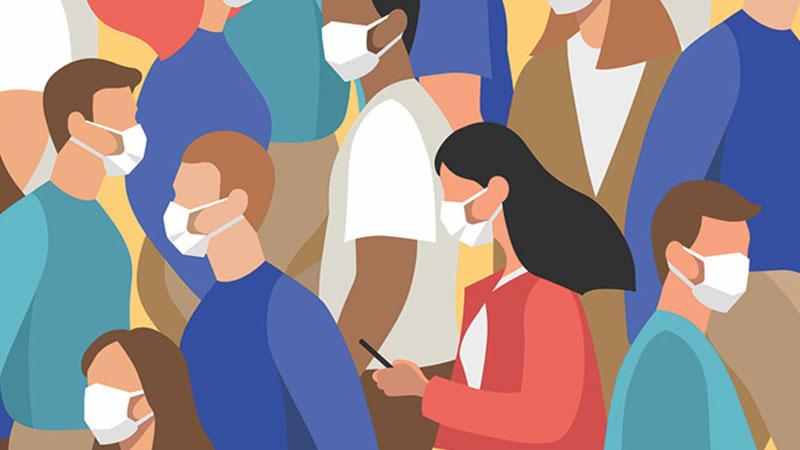
Wearing face masks continuously can cause a serious health risk, say leading medics.
Employees, especially in the public sector, who are more or less compelled to permanently wear the masks as requested by the health authorities are exposed to an imminent health threat. By wearing a mask, the exhaled viruses will not escape and will concentrate in the nasal passages, enter the olfactory nerves and travel to the brain.
"Face masks make breathing more difficult," is the common sentiment and medics claim that for people with COPD (chronic obstructive pulmonary disease), which causes decreased air flow — "face masks are in fact intolerable to wear as they worsen their breathlessness.
A fraction of the carbon dioxide previously exhaled is inhaled at each respiratory cycle. These two phenomena increase breathing frequency and deepness, and hence they increase the amount of inhaled and exhaled air.
This may worsen the burden of Covid-19 if infected people wearing masks spread more contaminated air, medical experts claim.
This may also worsen the clinical condition of infected people if the enhanced breathing pushes the viral load down into the lungs.
If you feel you have Covid-19, you should quarantine yourself and remove the mask. Contact a medical professional to discuss the next steps – these are guidelines given by some European experts.
Dr. Russell Blaylock, author and health expert, warns that not only do face masks fail to protect the healthy from getting sick, but they also create serious health risks to the wearer. The bottom line is that if you are not sick, you should not wear a face mask.
As businesses reopen, many are requesting shoppers and employees to wear a face mask. As for the scientific support for the use of face masks, a recent careful examination of the literature, in which 17 of the best studies were analysed, concluded that, “None of the studies established a conclusive relationship between mask or respirator use and protection against the influenza infection.”Keep in mind, no studies have been done to demonstrate that either a cloth mask or the N95 mask has any effect on transmission of the Covid-19 virus. Any recommendations, therefore, have to be based on studies of influenza virus transmission. And, as you have seen, there is no conclusive evidence of their efficiency in controlling flu virus transmission.
There is a difference between the N95 respirator mask and the surgical mask (cloth or paper mask) in terms of side effects.
The N95 mask, which filters out 95% of particles with a median diameter greater than 0.3 µm2, because it impairs respiratory exchange (breathing) to a greater degree than a soft mask, and is more often associated with headaches. In one such study, researchers surveyed 212 healthcare workers (47 males and 165 females) asking about getting headaches with the use of the N95 mask, duration and type of headache and if the person had preexisting headaches.
They found that about a third of the workers developed headaches with use of the mask, most had preexisting headaches that worsened and 60% needed pain medication.
As to the cause of the headaches, while straps and pressure from the mask could be causative, the bulk of the evidence points toward hypoxia and or hypercapnia as the cause. That is, a reduction in blood oxygenation (hypoxia) or an elevation in blood C02 (hypercapnia). Elderly people or any person with poor lung function could pass out and hit their head on the ground. This, of course, could lead to death.
There is another danger if masks are worn on a daily basis, especially if worn for several hours. When a person is infected with a respiratory virus, they will expel some of the virus with each breath.
If they are wearing a mask, especially an N95 mask or other tight-fitting mask, they will be constantly rebreathing the viruses, raising the concentration of the virus in the lungs and the nasal passages.
We know that people who have the worst reactions to the coronavirus have the highest concentrations of the virus early on. And this leads to the deadly cytokine storm in a selected number.
